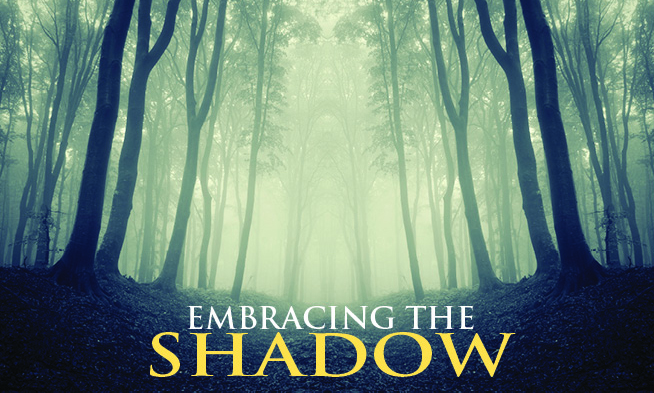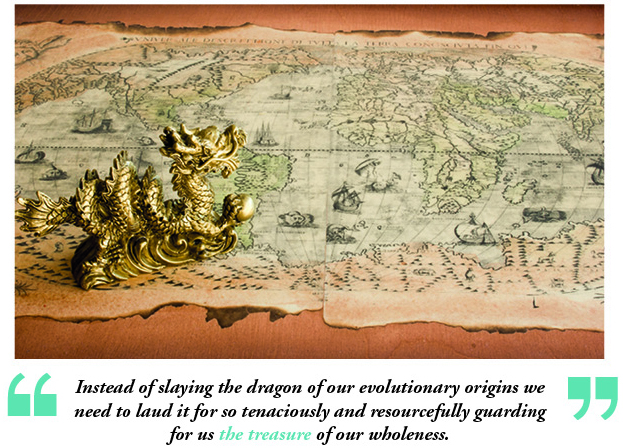Embracing the Shadow
by:
Jasbinder Garnermann
Published:
Thursday, April 3, 2014

Greedy, jealous, cowardly, dishonest, lazy, vindictive, violent and irrational, the shadow gives the lie to our civilized exteriors. Ranging from embarrassing Freudian slips to full-on psychosis, our shadow outbursts mock our best efforts to appear as rational and agreeable creatures. The shadow is the big moral problem of our times, a part that should have been left behind with the Stone Age and which yet remains strangely gripping and compulsive, exploding into our lives with disastrous timing. On a collective scale, the shadow has wrecked civilizations, caused wars, genocides, and the butchery of our fellow-creatures.
The power of the shadow derives from its origins in our evolutionary history – the instincts and drives of the ancient, lower brain. Jung termed this part “the two-million-year-old human being in us all”. It contains the terrors and struggles that we have faced since our primal beginnings, the hard-wiring of our responses to starvation, illness, predators, and natural disasters. This existential terror, the memory of catastrophe encoded in our DNA, is the deepest aspect of the shadow. Our rejection of this self and the subsequent frustration of archetypal drives, Jung felt, was the cause of contemporary angst, mental and even physical disorders.
As well as our evolutionary history, the shadow also contains our lost personal history. Unbearable feelings of abandonment, panic, rage and frustration when our needs were not met in infancy, the rejection of our instincts and the resulting shame, guilt and self-disgust absorbed in childhood, all these intense unprocessed experiences went to form our shadow.
It is this aspect of the shadow that gives rise to the sense of the enemy within. The shadow was originally projected entirely on to Nature – the dark night, the sinister forest, the devouring sea, and everything unknown was shadow territory. Later, these fears took on a more anthropomorphic form and became vengeful gods, the Devil and other figures of evil, either supernatural or human. As we began to live in groups, we realized that our survival depended on our ability to curb our basic drives and co-operate with each other. For both children and adults, it became vital to learn how to adapt socially. Failure to do so meant ostracization and even death. So our laziness, greed, sexuality, fear, and rage all became the enemy within.
Our sense of having to deal with something strange and primitive within also produced, in most cultures, the myth of the battle between the hero and the dragon (or monster). Symbolically the dragon represented the drives of the lower brain, and the hero’s task was to safe-guard consciousness by slaying these primitive forces. Certainly religion regarded these as evil and dangerous, and imposed structures and commandments to protect us from the perils of regression. The Enlightenment and its contempt for the non-rational further removed us from our instinctual and primal roots. As the split in our nature widened, the shadow gained in charge and intensity.
The extreme form of the split-off shadow is acted out in psychopathology, in murder, perversions and the insatiable greed of a predatory capitalism. Each unacknowledged shadow adds to the sum of the collective shadow - the rough beast slouching towards Bethlehem in Yeats’ poem is the collective shadow of humanity, grown monstrous and unwieldy through neglect and denial.
The easiest way to identify our personal shadow is through our projections. Is there somebody we love to hate? Do we despise someone because they are mean, cowardly, lazy, or deceitful? Or criticize someone for being a gossip? Are we constantly annoyed at someone for being judgmental, rigid, or arrogant, too greedy or sluttish, or too macho or butch? Whenever somebody gets to us disproportionately we can be sure that they are carrying either a despised part of ourselves or what we would like to be if only we had the daring. One can see from this how little we belong to ourselves, and how much destruction our shadow projections cause in our relationship with others.
Children often carry their parents’ shadow, living out in their own lives the repressed instincts of parents, and becoming the scapegoats even for ancestral complexes. Other races and cultures are also soft targets for the shadow, creating the perfect fit of mutual projections which explode in war and terrorism, matches made in hell. Closer to home we can have biases against groups of people who threaten the status quo – mentally ill people, unemployed people, drug addicts, gays, travellers, single mothers; or people who arouse our envy – people who are too rich, too famous, too powerful, or too beautiful.
Withdrawal of projections is crucial to working with the shadow. This means firstly relinquishing the entanglement and stewing in the hot affects of our rage, envy or greed. Then comes the step of owning what was projected: to realize that perhaps we too are a little bit dishonest, a bit mean, self-serving, even sadistic, cruel and psychopathic in the darker recesses of our psyche. As we learn to bear the burden of our own nature, we become kinder, and genuinely moral. This is because we are now taking responsibility for our conscious as well as our unconscious psyche.
The extreme manifestation of the shadow on a mass scale erupted during the Holocaust when one of the most cultured nations in Europe produced a political party which systematically and as part of its manifesto slaughtered eleven million men, women and children, a genocide in which the whole nation became complicit. The gypsies, the mentally ill, the physically handicapped, the homosexuals, the subversives, the Jews, all were made the scapegoats to carry the inferiority complex of the Germans. These minorities also had another quality in common: they were seen to embody the very opposite of the tyrannical discipline which was inflicted on their abusers during childhood. The Germans could have done with and unconsciously needed precisely the “degenerate” qualities that they despised in their victims.

Today, the most vulnerable targets of our shadow projections are animals. Projecting our own greed, lust, expediency, and aggression on to animals, we treat them with a sadism and cruelty which will horrify us one day. We rationalize our psychopathy in several ways – animals have no soul, they are here for our use, they have no feelings, they are not conscious, they are dirty, smelly, disgusting.. We force them to breed, then slaughter their children, break their bodies in experiments, destroy their homes, cull their families. We can see the psychology of the Holocaust alive and well in our moral insanity towards animals.
If we could take back our shadow projections from animals, we would marvel at how fine-tuned, measured and purposive their instincts are. We would discover that morality is deeply rooted in instinctual behaviour, in the self-sacrificing devotion of a mother to her young, the strict codes of conduct that govern a pack, the deep bonds of kinship in a herd. Also, how the humble acceptance of limitations and one’s place in nature confers grace and is the essence of true piety. Our own archetypal behavior is rooted in nature, and it is because we have come so far away from it that we feel rootless, abandoned and desolate.
The intuitive wisdom of our animal nature transcends rational intelligence. The result of millions of years of adaptation, this wisdom tunes us in to the subtlest of signals in our environment and our bodies, as well as to impending events. We have become so far removed from our instincts that we now need experts to tell us what and when to eat, how much to exercise, even how to bring up our children, how to love, and how to grieve.
On the level of the instincts but also far deeper and subtler, throbs the jungle beat of our heart, the hormonal signals that bathe every moment of our existence, the sheer marvellous chemistry of life - oxytocin, pheromones, all the communication that goes on at the level of these ancient markers, and where all real deals take place, whether in love or war.
One of the most productive and enjoyable ways of working with the shadow is through our dreams, by launching peace talks between the two sides of our nature. In dreams dark sinister landscapes represent shadow territory. Also sinister figures, muggers, rapists, burglars, druggies, the homeless, murderers and terrorists are all classic shadow characters. However unpleasant the figure may be, we can be sure that it is embodying in extreme form the precise quality that we need in order to become whole and balanced, in order to individuate. The prude needs the prostitute, the workaholic needs the druggie, and the intellectual needs the bimbo.
Animals carry our shadow side especially when as children trying to integrate our drives we have nightmares of being chased by bears or tigers, ferocious dogs and raging bulls. Snakes - cold-blooded and far removed from us on the evolutionary scale - symbolize the primitive psyche, and also unconsciousness. Rats are very common symbols in our dreams - the shadow thoughts just at the edge of consciousness, dirty, scurrying, and spreading the plague.
It’s when we can marvel at the gleaming teeth of the tiger, or the glossy fur of a rat that we begin to let the Other into our lives, with all its passion, energy and drive. Aggression becomes the courage that defends the integrity of the Self, envy is transformed into the drive for excellence, the thrill of the hunt turns into cutting-edge creativity.
As we begin to discover constructive outlets for the energy of the shadow, our dreams too change. Same-sex figures with whom we have an unspoken and deep connection, clearing out rubbish or clutter, putting on washes, strong physical sensations, breaking bread with strangers, fresh coats of paint with vibrant colours, playful dogs, contented cats big and small, herculean horses and elephants all reflect breakthroughs in our work with the shadow.
Jung wrote that the shadow is 90% pure gold. By accepting responsibility for it, we can heal the age-old inner divide in our nature, and become at one with ourselves and with all others too. Instead of slaying the dragon of our evolutionary origins we need to laud it for so tenaciously and resourcefully guarding for us the treasure of our wholeness.
About the author:
Jasbinder Garnermann is the Chairwoman of the C.G. Jung Society of Ireland. The society holds lectures, workshops and training courses on all aspects of Jungian psychology.
You can also contact Jasbinder on 085-7610354 for one-to-one dream-interpretation sessions.
www.jungcentre.com
[email protected]
Latest Issue
Upcoming Events
-
17/04/2020 to 26/04/2020
-
18/04/2020
-
23/04/2020
-
15/05/2020 to 23/05/2020
-
16/05/2020 to 17/05/2020
Recent Articles
Article Archive
- November 2011 (2)
- January 2012 (3)
- February 2012 (2)
- March 2012 (2)
- April 2012 (4)
- May 2012 (4)
- June 2012 (1)
- July 2012 (3)
- August 2012 (2)
- October 2012 (2)

